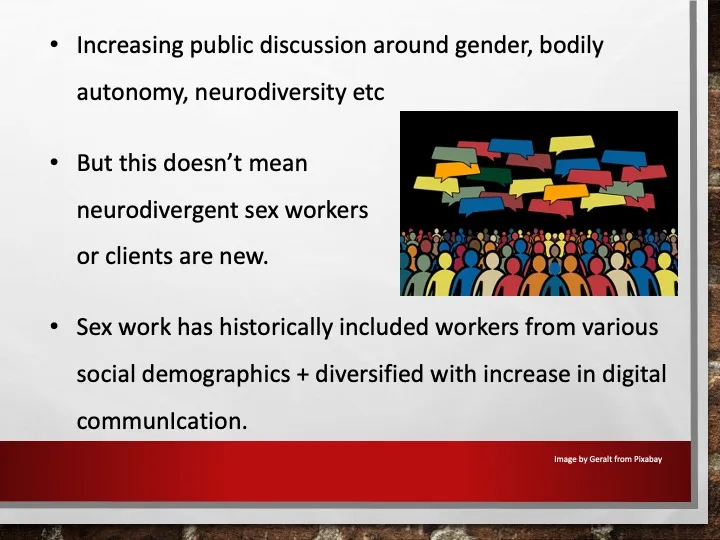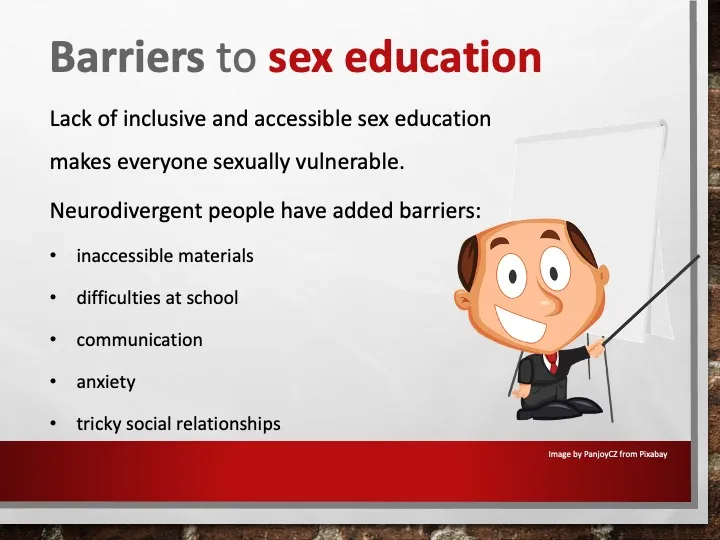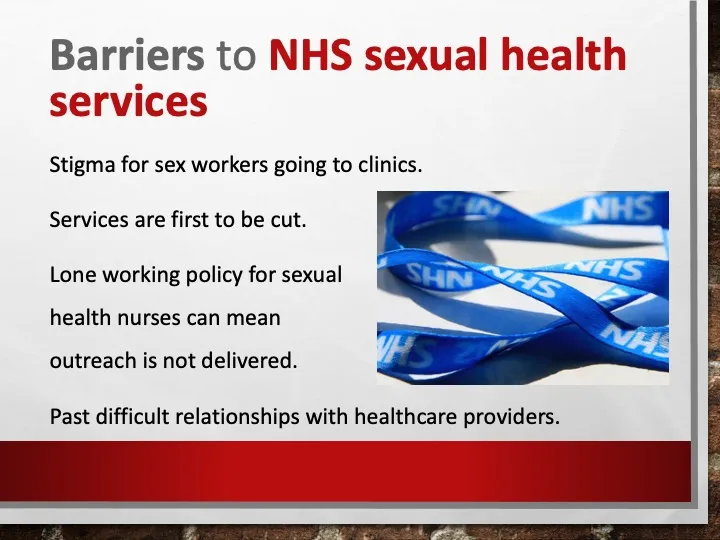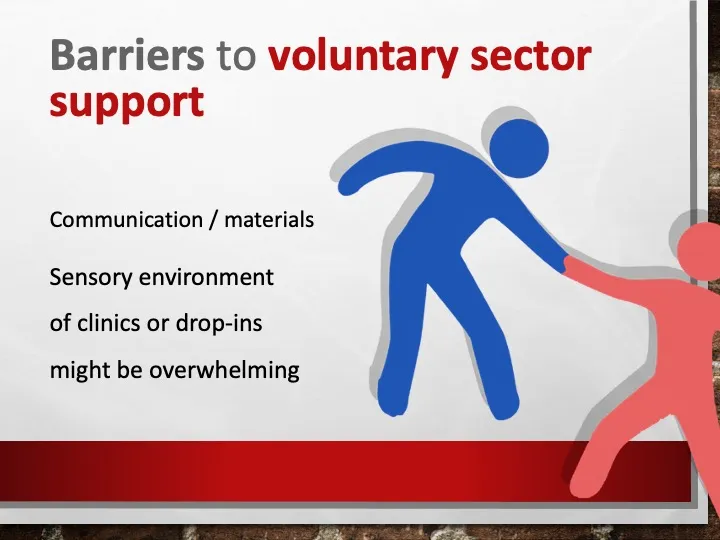Neurodiversity and sex work
Janine Booth and Liz Yeates explore the issues.
Neurodiversity and sex work: A new issue?
Public discussion around issues such as gender, bodily autonomy and neurodiversity is increasing. But this does not mean that neurodivergent sex workers or clients are new.
Sex work has historically included workers from various social demographics. And the sex industry has diversified with the increase in digital communication.
But sex work is stigmatised, which amplifies stereotypes across gender, race and class – and disability and neurotype.
Unfortunately, those public discussionS rarely differentiate between sexual exploitation and sex work.
There is a lack of sex-positive research about or by neurodivergent academics, but there is plenty of positive content by and about neurodivergent sex workers.
Neurodiversity and sex work: Why might neurodivergent people become sex workers?
There are various reasons why neurodivergent people may become sex workers.

Perhaps the most significant is difficulty in getting and keeping other jobs. Hayley writes:
“Since entering the workforce at 17, I’ve struggled working in retail, hospitality and customer service. I was beginning to believe I was doomed. That I was “too stupid” to maintain a job. At 25, I was diagnosed with the combined ADHD type, and all the missing pages in my life were filled with labels and terminology I could understand. I wasn’t “too stupid” for work, I was just working jobs that did not support my requirements. That was until I entered the sex work industry. Finally, I had a job where my skills and lifestyle thrived.”
Sex work may also appeal to people who reject hierarchies, gender and social norms, as many neurodivergent people do. Moreover, neurological variations may cater for specific sex markets, sex work requires no formal qualifications, and some neurodivergent people find that it matches their neurodivergent skills. Vixen writes:
“A large part of our job is engaging in conversations with strangers and taking calculated risks in order to get clients to book you. This means that it pays to be a fast thinker, out of the box thinking, adaptable and great at improvising – skills that I possess due to having ADHD!”
Vixen
For some neurodivergent people, sex work may offer increased control over working hours and working environment
And some have developed skills and ‘masking’ or dissociating in a hostile society, and can apply those skills in sex work. Hayley says:
“All my years of masking made me perfect for providing the Girlfriend Experience. While dating in my civilian life gives me extreme anxiety, when I’m working as Hayley I know exactly what to do and when.”
Hayley
However, some neurodivergent people may be sex workers because they have been manipulated or coerced into it.
Neurodiversity and sex work: Why might neurodivergent people pay for sexual services?
Support Autistic Adults’ Intimate Lives (SAAIL) suggests that autistic people may find paid-for sexual services a valuable space to explore sexual and sensory needs and interests, and an opportunity to gain sexual experience in a non-judgemental environment.
For some, the clear, contractual and consensual nature of paid encounters means that they are not fraught with uncertainty and indirect communication common in casual sexual encounters
Neurodiversity and sex work: The social model of disability
When we look at the issues facing neurodivergent people in sex work, it is useful to use the social model of disability. This means understanding that while neurodivergence is a difference, and may involve impairment, it is barriers within society that disable people.
What are those barriers for neurodivergent people in the sex industry?
Neurodiversity and sex work: Barriers to sex education
Lack of inclusive and accessible sex education makes everyone sexually vulnerable.
Neurodivergent people have particular barriers: inaccessible (eg. dyslexia-unfriendly) materials; difficulties at school; atypical communication; anxiety; and tricky social relationships.

Neurodiversity and sex work: Barriers to consent
Some neurodivergent people have learning disabilities, which will impact on their capacity to consent.
If the client and the worker are of different neurotypes, there may be difficulties with communication. Different neurotypes interpret cues, body language and signals differently, but these play an important role in sex and consent.
Neurodiversity and sex work: Barriers to accessing NHS sexual health services
It can be difficult to access NHS sexual health services, even those specifically for sex workers. There is stigma for sex workers going to clinics, and many have had a difficult relationship with healthcare providers.
These services are often the first in line when funding is cut. With the shortage of resources and staff, and policies to protect sexual health nurses from the dangers of working alone, it may become impossible to deliver outreach services.

Neurodiversity and sex work: Barriers to accessing voluntary sector support
An alternative might be to seek support from voluntary sector organisations, but neurodivergent people face barriers here as well.
Communications and materials may be inaccessible, and the sensory environment of clinics or drop-ins might be overwhelming.
Moreover, not all services are sex-positive, and sex workers generally won’t deal with ‘saviour’ charities. They may also worry about the threat of being reported to the police or children’s services.

Neurodiversity and sex work: Reducing the barriers
There are various issues to consider here. Sex workers, their clients, and services which support them, will want to think about how to reduce barriers and help make sex work safer and less coercive.
Neurodiversity and sex work: Further information and support
- SHADA: Sexual Health and Disability Alliance
- TLC Trust: responsible sexual services for disabled people
Neurodiversity and sex work: Book our training!
Does your organisation work with sex workers? Do you want to know about neurodiversity and sex work? Could you make your organisation’s work more neuro-inclusive?
Red in the Spectrum offers an in-person workshop and a webinar on neurodiversity and sex work. For more information and to discuss your requirements, please contact us.






